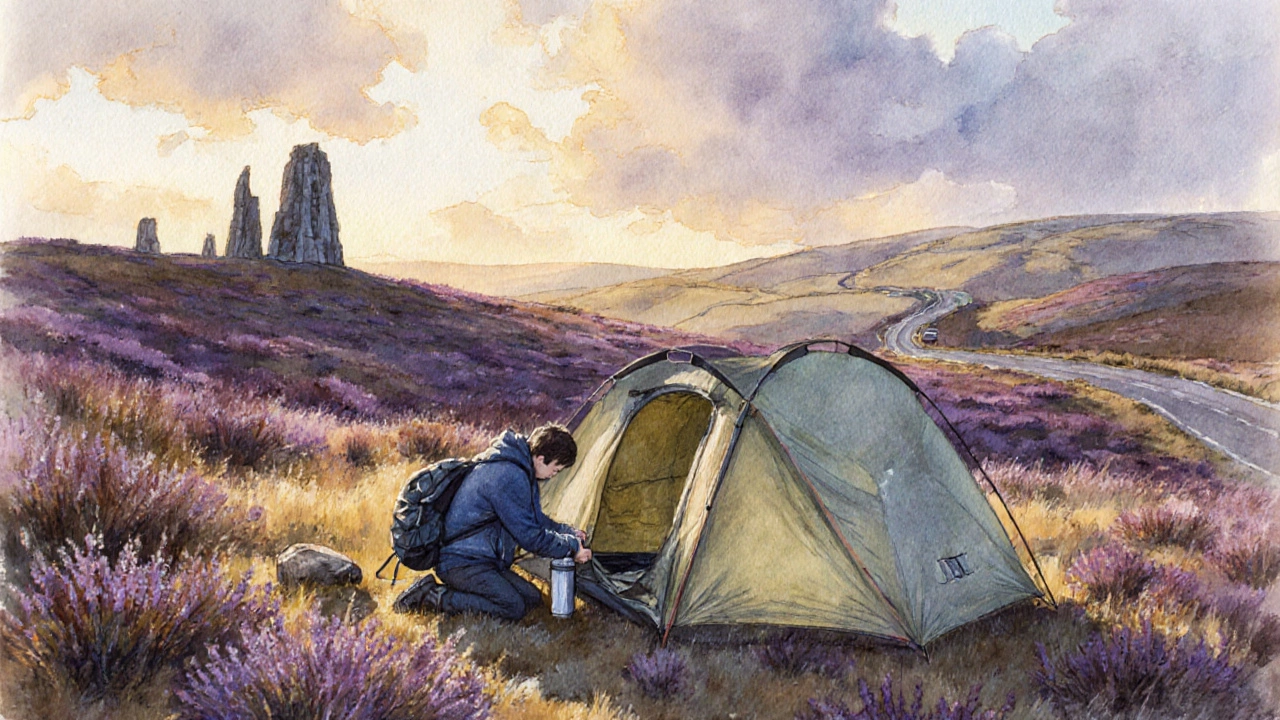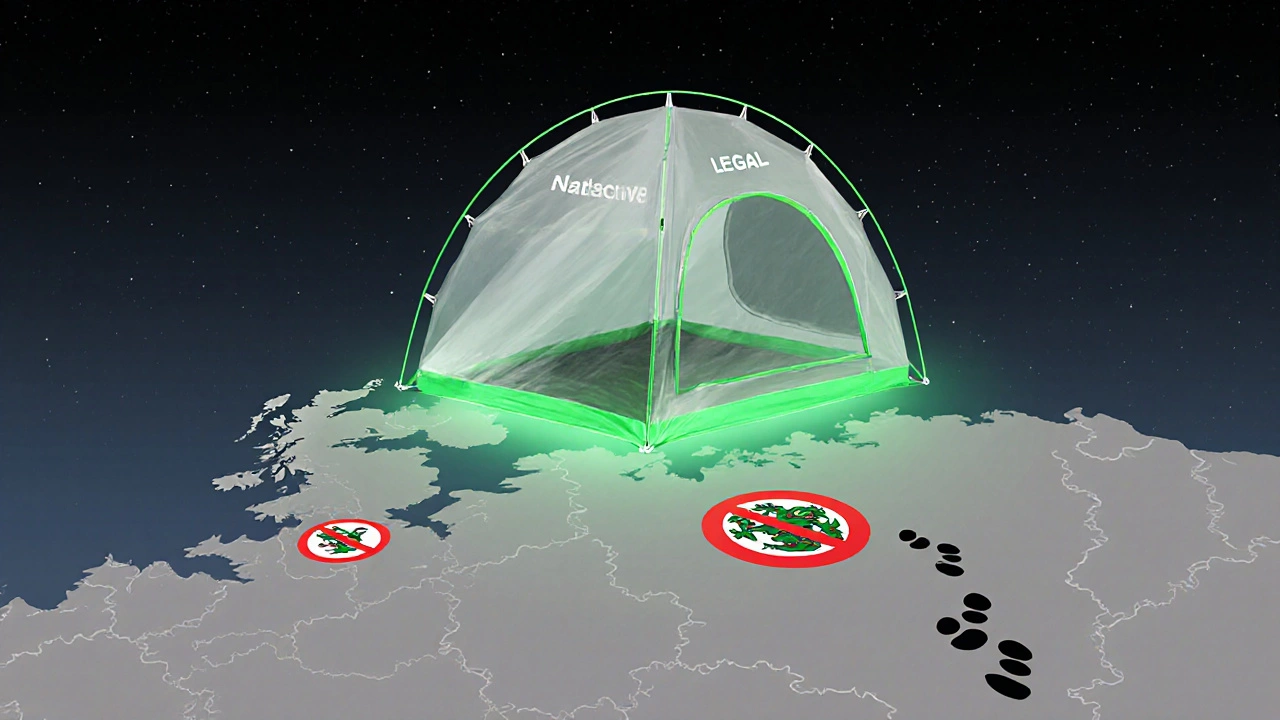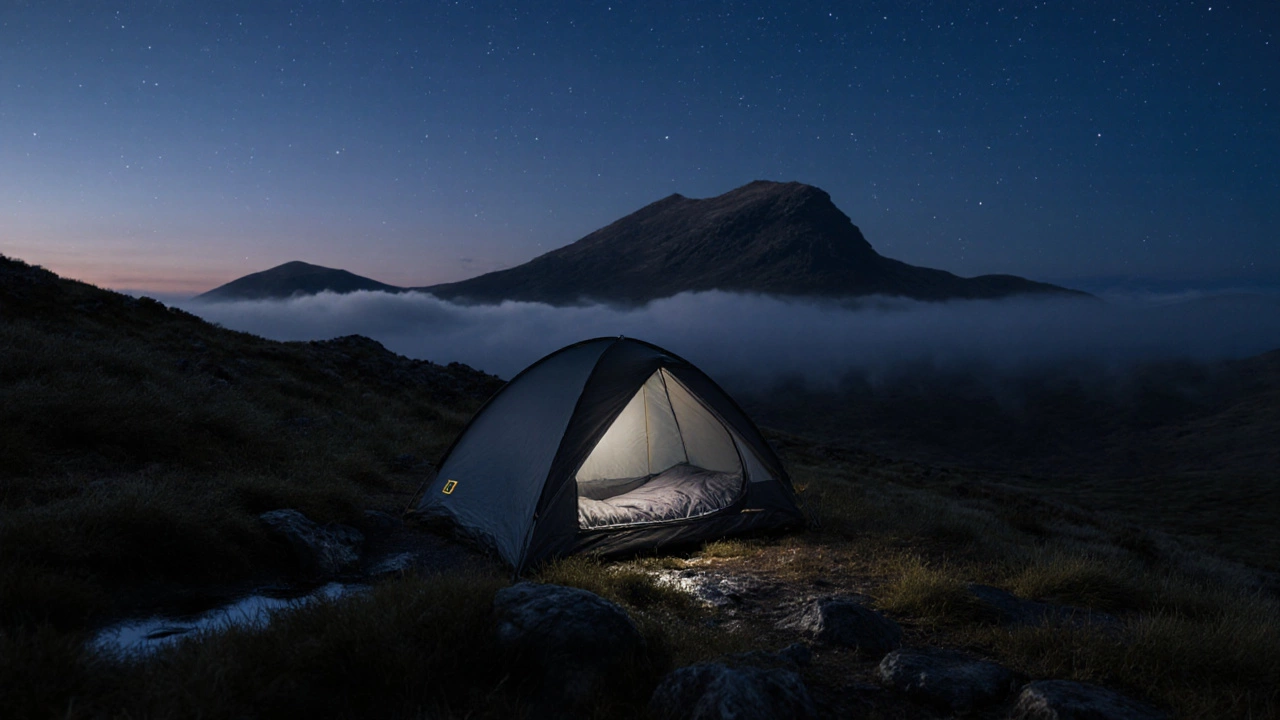You pack your tent, grab your sleeping bag, and head for the hills-only to wonder: can you sleep in a tent in the UK? It sounds simple. But the truth? It’s not as straightforward as it looks. In Scotland, yes. In England and Wales? Mostly no. And in Northern Ireland? It’s a gray zone. If you’re planning to pitch your tent outside a designated campsite, you need to know the law, the ethics, and the local attitudes-or risk fines, confrontations, or worse.
Wild Camping Is Legal in Scotland-Here’s How
Scotland is the only part of the UK where wild camping is clearly legal, thanks to the Land Reform (Scotland) Act 2003. This law gives you the right to access most land for recreation, including camping, as long as you act responsibly. That means no large groups, no fires in sensitive areas, no littering, and no staying in one spot for more than two or three nights.
People camp on the shores of Loch Lomond, under the shadow of Ben Nevis, and beside remote glens without permission. You’ll see tents everywhere in the Highlands. But here’s the catch: you can’t camp in enclosed fields, near houses, or in popular tourist spots like the Trossachs during peak season. Local councils and landowners can ask you to leave if you’re causing problems-even if you’re following the law.
Most experienced wild campers follow the Scottish Outdoor Access Code. It’s not just rules-it’s a mindset. Pack out everything you bring in. Use a stove, not a fire. Keep your tent small and hidden. Leave no trace. Do that, and you’ll rarely get questioned.
England and Wales: It’s Illegal-Unless You’re Quiet
In England and Wales, wild camping without landowner permission is technically illegal. All land is privately owned, and camping without consent is trespassing. That includes national parks like the Lake District, Snowdonia, and the Peak District. You can’t legally pitch your tent on a mountainside, beside a river, or in a forest clearing unless the landowner says yes.
But here’s what happens in practice: thousands of people do it anyway. And most of the time, nothing happens. Why? Because enforcement is rare. Police and rangers don’t have the resources to chase every tent. If you’re quiet, small, and gone by sunrise, you’re unlikely to get caught.
There are exceptions. Dartmoor National Park allows wild camping under specific conditions: you must be more than 100 meters from roads, stay no more than two nights in one spot, and avoid enclosed fields. This is the only place in England with a legal exception. Elsewhere? You’re on your own.
Many campers use a strategy called “stealth camping.” Pitch after dark, leave before dawn. Use a small, dark-colored tent. Don’t light a fire. Don’t leave trash. Don’t play music. Don’t park your car right next to your tent. If you do all that, you’re not breaking the spirit of the law-even if you’re breaking the letter of it.
What Happens If You Get Caught?
Most of the time, nothing. A ranger or landowner might ask you to move on. Sometimes they’ll give you a warning. Rarely, you’ll get fined. The law says trespassing can lead to a fine under the Highway Act 1980 or Public Order Act, but these are rarely used for campers.
There have been a few high-profile cases. In 2023, a group of 15 people camped on a private farm near the Brecon Beacons. The landowner called the police. Everyone was asked to leave. No fines were issued. In another case, a camper was told to move by a National Park officer in the Lake District-then offered a map of legal camping spots.
The real risk isn’t the law. It’s reputation. If you’re loud, messy, or disrespectful, you’ll make life harder for everyone else. Landowners start posting “No Camping” signs. Rangers get stricter. Local councils push for bans. That’s why the wild camping community has a strict code: be invisible, be quiet, be gone.

Where to Camp Legally (Without Getting in Trouble)
You don’t have to break the law to enjoy the wild. There are legal options that feel just as free.
- Dartmoor National Park (England): As mentioned, you can camp here legally if you follow the rules. Look for spots near remote tors like Haytor or High Willhays.
- Forest of Dean (Gloucestershire): Some woodland areas allow wild camping through private land agreements. Check with local groups like the Forest of Dean Wild Campers.
- Lochaber and the Cairngorms (Scotland): The most popular spots, but also the most crowded. Go midweek, avoid weekends, and camp away from trails.
- Wild camping apps: Use apps like Wildcamping UK or CamperMate to find spots where others have camped legally. These aren’t official, but they’re crowdsourced and updated by real users.
- Low-impact camping sites: Some small, family-run sites charge £5-£10 a night and are tucked away in fields or woods. They’re not glamorous, but they’re legal and quiet.
The Ethics of Wild Camping
Legal or not, wild camping is about respect. You’re borrowing someone else’s land. You’re not entitled to it. That’s why experienced campers follow the Leave No Trace principles-five simple rules that keep the countryside open for everyone.
- Plan ahead and prepare. Know the weather, the terrain, and the rules.
- Travel and camp on durable surfaces. Avoid fragile grass, moss, or wildflower areas.
- Dispose of waste properly. Carry out all trash-including food scraps and toilet paper.
- Leave what you find. Don’t pick flowers, move rocks, or carve your name into trees.
- Minimize campfire impact. Use a stove. If you must have a fire, use an existing ring, keep it small, and drown it completely.
Also, don’t camp near livestock. Sheep and cows get stressed by tents and noise. If you see a field with animals, walk 200 meters away. It’s not just polite-it’s practical. A startled cow can charge. A scared sheep can injure itself.

What About Winter Camping?
Winter wild camping is growing in popularity. The crowds are gone. The skies are clearer. But the risks are higher. Temperatures drop below freezing. Rain turns to sleet. Paths become muddy and slippery.
Most people who camp in winter stick to Scotland. The weather in the Highlands is harsh, but the terrain is forgiving. In England and Wales, winter camping is risky. You’re more likely to get caught in a storm. Roads are closed. Mobile signals die. Rescue teams are stretched thin.
If you do winter camp, bring a four-season tent, a sleeping bag rated to -5°C, and a stove that works in cold weather. Test your gear before you go. Tell someone where you’re heading. Carry a GPS beacon. Don’t go alone.
Final Answer: Can You Sleep in a Tent in the UK?
Yes-but only if you know where, when, and how.
In Scotland? Go ahead. Just be quiet and clean.
In England and Wales? It’s illegal. But if you’re discreet, respectful, and don’t stay long, you’ll probably be fine. Just don’t expect permission. Don’t expect sympathy. And never assume it’s okay just because others are doing it.
The UK isn’t like the US or Canada, where public land is abundant. Here, every field, hillside, and forest belongs to someone. Your right to camp isn’t guaranteed-it’s earned by how you behave.
So if you want to sleep under the stars in the UK, don’t just ask: Can I? Ask yourself: Should I? And if the answer is yes-do it right.
Is it legal to wild camp in the Lake District?
No, wild camping is not legal in the Lake District without landowner permission. The entire area is privately owned, and camping outside designated campsites is considered trespassing. While some people do it quietly, especially in remote valleys, you risk being asked to leave or fined if reported. Stick to official campsites or nearby low-impact sites for legal peace of mind.
Can you camp on the beach in the UK?
It depends. In Scotland, yes-if you’re away from private property and follow the access code. In England and Wales, beach camping is usually illegal unless it’s a designated campsite. Many beaches are owned by local councils or private estates. Even if the beach looks empty, you could be on private land. Always check local signs or ask the council before pitching your tent.
Do you need a permit for wild camping in Scotland?
No, you don’t need a permit to wild camp in Scotland under the Land Reform Act. But you must follow the Scottish Outdoor Access Code. That means camping in small groups, staying no more than two or three nights in one place, avoiding sensitive areas like farmland or tourist hotspots, and leaving no trace. Some areas, like Loch Lomond, have seasonal restrictions-check local notices before you go.
Can you sleep in a tent in a national park in the UK?
Only in Dartmoor National Park in England, where wild camping is legally permitted under strict rules. In all other UK national parks-including the Peak District, Snowdonia, and the Cairngorms-you need landowner permission. In Scotland, national parks like Loch Lomond & The Trossachs allow wild camping under the access code. In all cases, follow Leave No Trace principles to avoid trouble.
What’s the best time of year to wild camp in the UK?
Late spring (May-June) and early autumn (September-October) are ideal. The weather is mild, the days are long, and the midges aren’t yet swarming. Summer (July-August) is popular but crowded, especially in Scotland. Winter camping is possible in Scotland with proper gear, but it’s risky and not recommended for beginners. Avoid Easter and school holidays-these are peak times for complaints and enforcement.
If you’re planning your first wild camping trip, start small. Pick a quiet spot in Scotland, camp for one night, and leave no trace. If you’re in England, try a low-cost, off-the-beaten-path site instead. The goal isn’t to break the rules-it’s to protect the places you love so they stay open for everyone.
